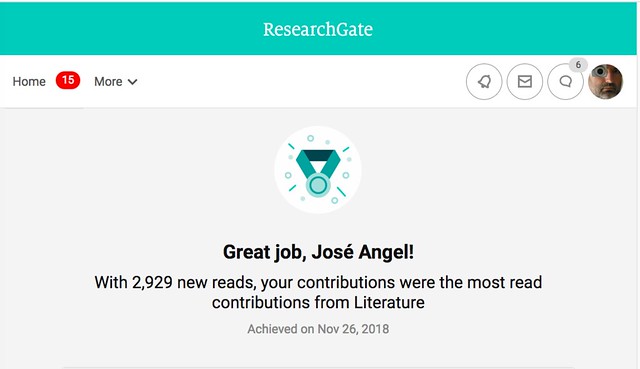🔴🔴🔴 Ya sólo nos queda decir gracias Andalucía, gracias España 😉✌— VOX 🇪🇸 (@vox_es) 30 de noviembre de 2018
El domingo la #EspañaViva hará historia y tú con ella 💪🇪🇸
#VotaVOX pic.twitter.com/Si3p2J4de8
viernes, 30 de noviembre de 2018
Still Standing
How We Understand Others
From New Books Network:

Social cognition includes the ways we explain, predict, interpret, and influence other people. The dominant philosophical theories of social cognition–the theory-theory and the simulation theory–have provided focused accounts of mindreading, the more specific practice of ascribing beliefs, desires, and intentions to others in order to predict and explain their behavior. In How We Understand Others: Philosophy and Social Cognition (Routledge, 2018), Shannon Spaulding draws on social psychological research and kindred spirits in philosophy to argue for an expansion of this traditional focus. In her Model Theory, mindreading includes other methods we use to understand others, such as stereotypes and scripts, and other goals of these practices, such as strengthening our in-group social relationships. Spaulding, who is assistant professor of philosophy at Oklahoma State University, also explores some of the implications of her view for understanding issues in epistemology and ethics, in particular epistemic injustice.
Shannon Spaulding
How We Understand Others
Philosophy and Social Cognition
Routledge 2018
November 15, 2018
Carrie Figdor
Social cognition includes the ways we explain, predict, interpret, and influence other people. The dominant philosophical theories of social cognition–the theory-theory and the simulation theory–have provided focused accounts of mindreading, the more specific practice of ascribing beliefs, desires, and intentions to others in order to predict and explain their behavior. In How We Understand Others: Philosophy and Social Cognition (Routledge, 2018), Shannon Spaulding draws on social psychological research and kindred spirits in philosophy to argue for an expansion of this traditional focus. In her Model Theory, mindreading includes other methods we use to understand others, such as stereotypes and scripts, and other goals of these practices, such as strengthening our in-group social relationships. Spaulding, who is assistant professor of philosophy at Oklahoma State University, also explores some of the implications of her view for understanding issues in epistemology and ethics, in particular epistemic injustice.
Podcast: Download (Duration: 1:03:51 — 58.5MB)
Fotos playeras

Me pitan los oídos. De repente hay gente que ha empezado a hablar de mí, y no para bien, a cuenta de mis fotos. Hasta ahora me había rodeado la indiferencia más absoluta, hasta un grado casi sorprendente, desde hace más de doce años. Tengo un fotoblog en Flickr con más de ochenta mil fotos, lo cual en sí mismo a mí me parece notable. Suelo decir que me especializo en cantidad, no en calidad, y el público viene a concurrir conmigo, premiándome con su indiferencia más absoluta. Hasta hoy. De repente se incendia la red.... Bueno, no, de repente hay unos chisporroteos de crítica negativa, primera reacción visible a destacar, debido a mis fotos playeras. Los 'me gusta' de mis ochenta mil fotos se cuentan con los dedos de una mano, así como los comentarios, y quizá pronto sean contrapesados en unos días por los "me disgusta". A ver, tampoco es para tanto: nadie me pone comentarios, ni positivos ni negativos; pero me han hecho llegar críticas y hasta noticias de denuncias, por parte de personas (presumiblemente puritanas) que ven pecaminosas y delictivas las fotos de mujeres en la playa. Las de hombres no, al parecer. Y me denuncian (según me dicen) a la Policía Nacional, al Observatorio de Igualdad de Género, a las autoridades académicas... A ver, en España es pecado todo (a juicio de según quien) y delito casi todo, si se estudian Vds. los dos millones de páginas de reglamentos y leyes que se publican cada año. (Está prohibido tender la ropa en la ventana, tocar la guitarra en la calle, correr, ir con bicicleta por el paseo, ir en coche por Madrid, poner la radio en la peluquería, etc.). Discutíamos hoy la posibilidad de que alguien quiera montar un torbellino de histeria puritana en torno a mí, como le sucedió a un caso más insigne, Francisco Ayala, en los USA, donde la cosa ésta de la histeria mediática y la Inquisición de la corrección política está quizá más avanzada. Mi teoría es que se puede generar un torbellino semejante en torno a casi cualquiera, y con casi cualquier excusa. En fin, que si mis fotos playeras o no playeras no gustan a terceros o terceras, les recomiendo que no las miren. Si alguien aparece en ellas y le desagrada, y no quiere salir, que me lo diga y se quita y santas pascuas. No parece tan difícil. Pero en fin y en suma, sí me entristece un poco no sólo la nube negra de puritanismo histérico e hipócrita que a veces me parece ver descender sobre Occidente en general, sino en mi caso más concreto, tanto esfuerzo y tiempo y dedicación dedicados a un fotoblog, y a la red en general, con miles y miles de fotos de las que alguna será apreciable, quizá, para que se pronuncien al respecto únicamente los más casposos autores de anónimos y las personas de escándalo fácil. Siempre son malos tiempos para la lírica, al parecer. Pero más me desanima aún el consenso de mis amistades, al efecto de que es prudente y aconsejable plegarse al criterio de esta gente y no hacer nada que pueda desagradarles o atraer sus condenas. Las presiones para no hacer nada que se salga de lo que no llame la atención a nadie son atmosféricas, y crecientes. Debería preocuparnos, quizá, este efecto aplanamiento de la red universal—pero más preocupa al parecer que no lo vaya a enredar a uno el torbellino de histeria mediática.
So it goes.
—oOo—
The Gender-Equality Paradox
El artículo más leído este año de la revista Psychological Science es éste: The Gender-Equality Paradox in Science, Technology, Engineering, and Mathematics Education, de Gijsbert Stoet y David Geary https://t.co/641wrNjEQ7— Pablo Malo (@pitiklinov) 30 de noviembre de 2018
jueves, 29 de noviembre de 2018
Bob Dylan - New York, Beacon Theatre (27th November 2018) [Full Concert, 4th Night]
New video for you today, and from 2018! The fourth show at the Beacon Theatre, only a few hours after it happened. This is the 38th concert of the 2018 US Fall Tour and the 80th of the year. Another fabulous performance, in great quality. A big thank you to DK-WI for recording this show and posting it so fast after it ended. This year we are marking the 30th anniversary of the Never Ending Tour, Bob constant touring around the world since Concord, CA, June 7th 1988. In 30 years, Bob radically changed his style and voice multiple times, releasing 14 studio albums (from Down In The Groove to Triplicate), and playing almost 3000 concerts. Bob is now taking over the Beacon for a seven nights residency, and singing some of his best performances he ever gave. This fourth show at the Beacon is fantastic as always. Bob voice is clear and the Band is on fire. The recording is in pristine quality, thanks to DK-WI. I really recommend you to listen to this concert from the first note to the last. The ballads can bring you to tears since they are so good.
boblinks.com gave it glowing review: http://www.boblinks.com/112718r.html
Here is the setlist 1. Things Have Changed 00:00 2. It Ain't Me, Babe 05:35 3. Highway 61 Revisited 09:57 4. Simple Twist Of Fate 14:48 5. Cry A While 20:35 6. When I Paint My Masterpiece 25:25 7. Honest With Me 31:24 8. Tryin' To Get To Heaven 36:23 9. Scarlet Town 41:08 10. Make You Feel My Love 47:07 11. Pay In Blood 51:42 12. Like A Rolling Stone 56:29 13. Early Roman Kings 1:03:52 14. Don't Think Twice, It's All Right 1:09:35 15. Love Sick 1:16:21 16. Thunder On The Mountain 1:21:29 17. Soon After Midnight 1:27:47 18. Gotta Serve Somebody 1:32:09 Encore 19. All Along The Watchtower 1:39:12 20. Blowin' In The Wind 1:42:44 #BobDylan #Beacon #NeverEndingTour Credits to boblinks.com for the informations and for their reviews. The first picture is the official poster for the tour. My next videos will be a mix of 1993 shows and onwards, and of course the usual new 2018 shows. I will continue to work on the next volumes of Blood On The Tracks live. As always, if you have more requests for shows or sessions you'd like to hear, send me a message or leave a comment below.
(from Sad Eyed Lady of the Lowlands)
—oOo—
Vox adelanta a Ciudadanos
VOX ya está por delante de Ciudadanos 😝 pic.twitter.com/JA29Djv7hC— VOX 🇪🇸 (@vox_es) 29 de noviembre de 2018
Retropost (19 de noviembre de 2008): Tombe la neige
Eso nos dice el parte, de camino a Biescas hoy. Así que desempolvamos nuestras cadenas, y nuestro Adamo:
Salimos cuando Ivo termine su partido de balonmano, en el que invariablemente lo golean. Menos mal que le han insuflado la teoría de que lo importante es participar.
Dicen que en el amor es lo mismo—consuélate, Adamo.
—oOo—
miércoles, 28 de noviembre de 2018
Retropost (28 de noviembre de 2008): La Torre Nueva y la Universidad de Zaragoza
Un escrito de Fernando Plo y Gerardo Sanz, difundido hoy por el Colectivo de Profesores. Sobre la reforma universitaria en curso, y las soluciones improvisadas:
En tiempos de relativa riqueza, a comienzos del siglo XVI, el concejo de Zaragoza mandó levantar una torre para albergar reloj y campanas. En tiempos menos boyantes, el mantenimiento de esa Torre Nueva se descuidó algo, y, a finales del siglo XIX la torre se había inclinado más de lo conveniente. Era necesario intervenir para repararla y se fue abriendo camino la idea de demolerla, como una opción rápida y definitiva.
Los comerciantes del sector, que veían en el mal estado de la torre un peligro para sus negocios, urgieron al ayuntamiento para que tomara medidas. Todo se decidió en muy poco tiempo, y la piqueta se llevó la torre antes de que la ciudad de Zaragoza pudiera darse cuenta y reaccionar.
Durante el último siglo se han multiplicado los intentos para recuperar esa torre, sin ningún éxito. Es más fácil demoler un edificio que volverlo a levantar.
La Universidad de Zaragoza se encuentra ahora frente al desafío de redefinir su mapa de titulaciones. Estamos en una etapa de recortes presupuestarios, y las opciones rápidas y definitivas tienen un atractivo evidente. Pero hay motivos para dudar de que estas opciones sean las mejores y las más eficientes. Sobre todo, si no se valoran los beneficios de mantener los títulos (renovándolos donde haga falta) y se sobrevaloran los ahorros que se obtendrían al eliminarlos.
Estamos todavía a tiempo. Cuesta mucho construir una titulación desde la nada. Hay que buscar edificios, preparar aulas, instalar equipamientos de prácticas. Todavía es más difícil formar un equipo de profesores especialistas. Las tareas de formación, si se hacen bien, son tareas de muchos años. También es difícil crear una red de relaciones: con empresas, para que los estudiantes puedan realizar prácticas; con universidades europeas, para que puedan realizar intercambios Erasmus. Los títulos nuevos también han tenido que definir sus nichos profesionales. El esfuerzo y el buen hacer de los antiguos titulados en el mercado laboral facilita la entrada y la demanda por parte de los empleadores de los nuevos titulados.
Todo esto es lo que se tira abajo cuando se elimina de raíz una titulación que ya está asentada. Como ocurre con los edificios, es más fácil cerrar una titulación que volverla a levantar desde la nada.
Estamos en un periodo de reflexión y decisiones en la universidad. Las reformas radicales son necesarias y todos estamos preparados para realizarlas. También esperamos que nuestras autoridades académicas, a la hora de tomar la decisión de suprimir títulos, valoren, aunque sea difícil de cuantificar, la pérdida que supone prescindir de una organización que funciona, de unas redes de relaciones y conocimiento establecidas, de un capital humano de especialistas, frente a un ahorro nominal, muchas veces ilusorio por las sinergias entre titulaciones que se imparten en un mismo centro.
Fernando Plo
Gerardo Sanz
—oOo—
Franco e hipócrita buen rollito con los chinos
Tras pasar meses clamando contra Franco, Sánchez agasaja al dictador chino Xi Jinping. Os cuento aquí cómo es la dictadura comunista a la que el presidente socialista español propone "una relación de confianza": https://t.co/E9u0NQSPOK
— Elentir 🇪🇸 (@elentirvigo) 28 de noviembre de 2018
William Wycherley
WYCHERLEY, William (1641-1715), of a Shorpshire family. He was educated first in France, then at the Queen's College, Oxford, but he never matriculated, afterwards enrolling as a student in the Inner Temple. His first play, Love in a Wood, or, St James's Park, a comedy of intrigue set in St. James's Park, was probably acted in 1671, and published in 1672, and brought him the favour of the duchess of Cleveland, the king's mistress. In 1679 he secretly married the widowed countess of Drogheda, daugher of the first earl of Radnor, and incurred thereby the displeasure of Charles II, who had offered him the tutorship of his son, the duke of Richmond. His second play, *The Gentleman Dancing Master, was probably acted 1671, published 1673, *The Country Wife was published and probably first acted 1675; his last play, *The Plain-Dealer, was probably acted 1676, published 1677. His Miscellany Poems (1704) led to a friendship with *Pope, who revised many of his writings. His Posthumous Works appeared in 1728.
Wycherley's plays, admired by *Lamb but condemned by *Macaulay as licentious and indecent, are highly regarded for their acute social criticism, particularly of sexual morality and the marriage conventions; his characterization and thematic organization are also strong, and his last two plays have been successfully revived many times. The standard edition is by A. Friedman (1969). (See also RESTORATION).
The Country Wife, a comedy by *Wycherley, published and probably first performed 1675. It is now considered by many to be his finest play, a sharp satiric attack on social and sexual hypocrisy and greed and on the corruption of town manners, but even in the author's time (see his own jokes on the subject in *The Plain Dealer) was attacked for its alleged obscenity. *Garrick's version, The Country Girl (1766), aimed to remove the original's 'immorality' and 'obscenity', and with them cut the character of Horner, a central figure of the plot, a witty libertine who spreads a false report that he is impotent as a result of an operation for the pox, and thus gains access to the favours of various women, each of whom believes he has sacrificed reputation for her sake.
The main plot concerns Mr Pinchwife, who comes to London for the marriage of his sister Alithea, bringing with him his artless young wife Margery; his excessive warnings against wrongdoing put ideas into her head, and she is eventually seduced by Horner, innocently protesting the while that she is merely behaving as town ladies do. Alithea's suitor Sparkish loses her to a new lover, Harcourt, through the opposite fault of excessive credulity. Pinchwife's conclusion, as he apparently accepts the excuse of Horner's impotence, is 'Cuckolds like Lovers shou'd themselves deceive.'
The Plain-Dealer, a comedy by *Wycherley, probably performed 1676, published 1677. It was highly praised by *Dryden and *Dennis, though from the start it was criticized for obscenity, and in the 18th cent. was performed in a version bowdlerized by *Bickerstaffe.
It is loosely based on *Molière's Le Misanthrope; Wycherley's hero Manly, an honest misanthropic sea-captain (from whom the playwright took the nickname 'Manly' Wycherley), corresponds to Molière's Alceste, and his treacherous, worldly beloved Olivia to Célimène. Manly, returned from the Dutch wars, has lost faith in all but Olivia, to whom he has confided his money, and his friend Vernish; he finds Olivia married to Vernish, and faithless even to him. Manly is beloved by Fidelia, a young woman who has followed him to sea in man's clothes; she intercedes with Olivia on his behalf, in a scene reminiscent of the Olivia-Viola scene in *Twelfth Night, is discovered by Vernish, who attempts to rape her, and is finally wounded in an attempt to defend Manly from Vernish. Manly forswears Olivia and pledges himself to Fidelia. There is a sub-plot in which the litigious widow Blackacre, who has a passion for legal jargon, trains up her son Jerry (a literary ancestor of Tony Lumpkin in *She Stoops to Conquer) in her footsteps, and thereby overreaches herself.
The Plain Dealer is also the name of a periodical established by A. *Hill.
—oOo—
—oOo—
Recentralizar la educación
Brandau, Dieter, et al. "Tertulia de Dieter: Recentralizar
la educación." EsRadio 27 Nov.
2018.*
2018
—oOo—
martes, 27 de noviembre de 2018
Diligencias, carpetazo y a correr
El muerto al hoyo, el legajo a la estantería, y a por otro expediente. Nulo interés por investigar y responsabilizar a la ETA. Nulo interés por buscarse problemas.
⚠️ En nueve de cada 10 atentados de #ETA ya juzgados han quedado impunes los colaboradores, los autores materiales o quienes ordenaron el asesinato https://t.co/0XeOQZzVpJ— El Independiente (@indpcom) 26 de noviembre de 2018
—oOo—
Aphra Behn (1650-1689)
From English Literature 1640-1789: An Anthology, ed. Robert DeMaria, Jr.
Poet, playwright, novelist, and translator, Aphra Behn was among the most versatile writers of her time. She is probably the first woman ever to make a living as a writer, and she was the first woman to be memorialized as a writer in Westminster Abbey. In surveying the history of English literature from her vantage point as a woman in the early twentieth century, Virginia Woolf would find in Behn a most important early advocate for the place of women in the world of letters.
Although the facts of Behn's early life are uncertain, she seems to have been born Aphra Johnson, and it is likely that as a young woman whe travelled to Surinam or British Guiana. She places herself ther amidst the scene of much of the action of her most famous novel, Oroonoko. On her return to England she probably married a merchant named Behn, whose family was Dutch. Shortly thereafter, from 1666-7, Behn was in Antwerp as a spy for the English government under the code name "Astrea," which she later used as her literary name. At some point early on her husband died or abandoned her, for she was briefly in debtor's prison in 1667. Not long after this, Behn began writing for a living: remarkably, she published over thirty separate volumes or pamphlets between 1676 and 1689, including an enormous epistolary novel that presents a recent scandal in a thinly veiled fiction [Love Letters between a Nobleman and His Sister]. Her work as a playwright began before this period of massive publication and continued deep into it. Behn wrote at least nineteen plays, the first of which to be published was The Forced Marriage (1670). The Rover, perhaps Behn's best play, was popular enough to support a sequel. The Rover is a romantic comedy about temporarily disenfranchised English Cavaliers and their escapades in the masquerad world of Venice at Carnival time. Like some of Behn's poetry, The Rover displays a mastery of sexual innuendo and bawdiness that is much more common in male writers and conventionally thought to be inappropriate in women. Contemporary satirical writings, like that of Thomas Brown, and later accounts, including the article in the Dictionary of National Biography, express dismay about Behn's morals. Happily, interest has lately returned to her diverse literary output, and perhaps most of all to her novel Oroonoko, or the Royal Slave.
There is an obvious temptation to read Oroonoko as a manifesto of anti-slavery, anti-colonialist, egalitarian, and perhaps even proto-feminist values, but the novel also has qualities that should appeal to those who are not interested in its usefulness to a political agenda. Although Behn draws on her knowledge of some historical incidents and persons, in genre the work is a romance, a popular fictional form designed to appeal to women and to members of the recently educated middle class. Oroonoko was certainly meant to be popular; but in a startling reversal of stereotypes, Behn substitutes Africans for the European nobles that traditionally take the lead roles in seventeenth-century romances. Yet, in many respects, Prince Oroonoko and his bride are nobler and more traditional than their European counterparts, and the work can be read as profoundly conservative, even though it is concerned with the injustices of the colonial system. Behn's politics always revolved around her extremely loyal royalism, which was not in conflict, for her, with her observations on the inequality of women, her obvious hatred of slavery, or her tacit campaign for the empowerment of women in the public as well as the private sphere. In short, when one tries to interpret Oroonoko, it resists easy solutions and displays some of the complexity and difficulty that many conservative critics think of as one of the defining qualities of art. Such complexity is not always evident in the language or the plot of the novel, but the book has all kinds of value for students of literature. In addition to its other virtues, Oroonoko shows the old, largely upper-class genre of the romance, in the process of transforming itself into a work with a broader social horizon and less parochial interests.
The text of Oroonoko is based on the first edition (1688). Most of the poems presented here come from Poems upon Several Occasions (1684). However, the text of "To the Fair Clorinda" is based on the version that appeared in Lycidus: or the Lover in Fashion (London, 1688), and both "Epitaph on the Tombstone of a Child" and "Ovid to Julia" come from Miscellany, Being a Collection of Poems by Several Hands (1685). The Works are being edited by Janet Todd (Ohio State University Press, 1992- ). I am indebted to Dod's notes on the poetry and on Oroonoko. There is a fairly recent critical biography by Angeline Goreau, Reconstructing Aphra (1980).
Poet, playwright, novelist, and translator, Aphra Behn was among the most versatile writers of her time. She is probably the first woman ever to make a living as a writer, and she was the first woman to be memorialized as a writer in Westminster Abbey. In surveying the history of English literature from her vantage point as a woman in the early twentieth century, Virginia Woolf would find in Behn a most important early advocate for the place of women in the world of letters.
Although the facts of Behn's early life are uncertain, she seems to have been born Aphra Johnson, and it is likely that as a young woman whe travelled to Surinam or British Guiana. She places herself ther amidst the scene of much of the action of her most famous novel, Oroonoko. On her return to England she probably married a merchant named Behn, whose family was Dutch. Shortly thereafter, from 1666-7, Behn was in Antwerp as a spy for the English government under the code name "Astrea," which she later used as her literary name. At some point early on her husband died or abandoned her, for she was briefly in debtor's prison in 1667. Not long after this, Behn began writing for a living: remarkably, she published over thirty separate volumes or pamphlets between 1676 and 1689, including an enormous epistolary novel that presents a recent scandal in a thinly veiled fiction [Love Letters between a Nobleman and His Sister]. Her work as a playwright began before this period of massive publication and continued deep into it. Behn wrote at least nineteen plays, the first of which to be published was The Forced Marriage (1670). The Rover, perhaps Behn's best play, was popular enough to support a sequel. The Rover is a romantic comedy about temporarily disenfranchised English Cavaliers and their escapades in the masquerad world of Venice at Carnival time. Like some of Behn's poetry, The Rover displays a mastery of sexual innuendo and bawdiness that is much more common in male writers and conventionally thought to be inappropriate in women. Contemporary satirical writings, like that of Thomas Brown, and later accounts, including the article in the Dictionary of National Biography, express dismay about Behn's morals. Happily, interest has lately returned to her diverse literary output, and perhaps most of all to her novel Oroonoko, or the Royal Slave.
There is an obvious temptation to read Oroonoko as a manifesto of anti-slavery, anti-colonialist, egalitarian, and perhaps even proto-feminist values, but the novel also has qualities that should appeal to those who are not interested in its usefulness to a political agenda. Although Behn draws on her knowledge of some historical incidents and persons, in genre the work is a romance, a popular fictional form designed to appeal to women and to members of the recently educated middle class. Oroonoko was certainly meant to be popular; but in a startling reversal of stereotypes, Behn substitutes Africans for the European nobles that traditionally take the lead roles in seventeenth-century romances. Yet, in many respects, Prince Oroonoko and his bride are nobler and more traditional than their European counterparts, and the work can be read as profoundly conservative, even though it is concerned with the injustices of the colonial system. Behn's politics always revolved around her extremely loyal royalism, which was not in conflict, for her, with her observations on the inequality of women, her obvious hatred of slavery, or her tacit campaign for the empowerment of women in the public as well as the private sphere. In short, when one tries to interpret Oroonoko, it resists easy solutions and displays some of the complexity and difficulty that many conservative critics think of as one of the defining qualities of art. Such complexity is not always evident in the language or the plot of the novel, but the book has all kinds of value for students of literature. In addition to its other virtues, Oroonoko shows the old, largely upper-class genre of the romance, in the process of transforming itself into a work with a broader social horizon and less parochial interests.
The text of Oroonoko is based on the first edition (1688). Most of the poems presented here come from Poems upon Several Occasions (1684). However, the text of "To the Fair Clorinda" is based on the version that appeared in Lycidus: or the Lover in Fashion (London, 1688), and both "Epitaph on the Tombstone of a Child" and "Ovid to Julia" come from Miscellany, Being a Collection of Poems by Several Hands (1685). The Works are being edited by Janet Todd (Ohio State University Press, 1992- ). I am indebted to Dod's notes on the poetry and on Oroonoko. There is a fairly recent critical biography by Angeline Goreau, Reconstructing Aphra (1980).
—oOo—
Masonería y política
1) MITO Y REALIDAD DE LA MASONERÍA (I): ¿HACEN POLÍTICA LOS MASONES?
— Luis del Pino (@ldpsincomplejos) 27 de noviembre de 2018
De hacer caso a los masones, la Masonería sería una especie de club social de carácter filantrópico y filosófico, que ni interviene ni pretende intervenir en política.
Elementos de Filmología
R. P. Fray Mauricio de Begoña, O. F. M. Cap. [ alias religioso de Manuel Fernández Vega (1907-1987) ]— Filosofía en español (@filosofiaorg) 27 de noviembre de 2018
Elementos de Filmología. Teoría del Cine https://t.co/igNckmHbkm
Bob Dylan & Friends - The 30th Anniversary Celebration (16th October 1992)
New York, Madison Square Garden (16th October 1992):
The 30th Anniversary Concert Celebration
Complete Rehearsals
1. If Not For You #1 (George Harrison) 00:00
2. If Not For You #2 (George Harrison) 04:05
3. Absolutely Sweet Marie #1 (George Harrison) 07:48
4. Absolutely Sweet Marie #2 (George Harrison) 09:20
5. Absolutely Sweet Marie #3 (George Harrison) 14:24
6. Love Minus Zero/No Limit (Eric Clapton) 18:52
7. Don't Think Twice, It's Alright (Eric Clapton) 25:14
8. It Takes A Lot To Laugh, It Takes A Train To Cry #1 (Bob Dylan & Eric Clapton) 31:29
9. It Takes A Lot To Laugh, It Takes A Train To Cry #2 (Bob Dylan & Eric Clapton) 34:32
10. It Takes A Lot To Laugh, It Takes A Train To Cry #3 (Bob Dylan & Eric Clapton) 40:34
11. My Back Pages #1 (Roger McGuinn/George Harrison) 46:07
12. My Back Pages #2 (Roger McGuinn/George Harrison) 51:05
13. My Back Pages #3 (Roger McGuinn/George Harrison) 57:31
14. My Back Pages #4 (Roger McGuinn/George Harrison) 1:01:59
15. My Back Pages #5 (Roger McGuinn/George Harrison) 1:08:15
16. Just Like Tom Thumb's Blues (Neil Young) 1:13:00
17. All Along The Watchtower (Neil Young) 1:14:30
18. All Along The Watchtower (Neil Young) 1:17:26
19. Forever Young (Neil Young) 1:25:12
20. License To Kill (Tom Petty) 1:32:09
21. License To Kill (Tom Petty) 1:38:25
22. License To Kill (Tom Petty) 1:41:00
23. Rainy Day Women # 12 & 35 (Tom Petty) 1:45:44
24. Mr. Tambourine Man (Roger McGuinn/Tom Petty) 1:51:18
25. Mr. Tambourine Man (Roger McGuinn/Tom Petty) 1:58:04
26. Interview (Eric Clapton) 2:01:51
Outtakes From The Show
1. Wanted Man (George Thorogood) 2:13:35
2. I Want You (Sophie B. Hawkins) 2:16:30
3. Love Minus Zero/No Limit (Eric Clapton) 2:23:17
4. If Not For You (George Harrison) 2:28:11
5. Song To Woody (Bob Dylan) 2:32:43
—oOo—
Retropost (27 de noviembre de 2008): Monster
Película basada en la historia de Aileen Wuornos, prostituta que decidió empezar a matar clientes en lugar de pasar por la piedra y cobrar lo acordado. El tono de toda la película va destinado, desde el principio, a hacernos comprender las actuaciones y el personaje de Lee (Aileen): de niña descuidada y maltratada, pasando por embarazo infantil, carrera de prostitución y mala vida, hasta llegar a la desilusión casi total con el género humano.
Lee ya está algo añosa como prostituta de lo más tirado, tiene un carácter violento y desagradable, inteligencia mínima y educación insuficiente para sacarse de la cuneta donde está sin un mínimo esfuerzo—esfuerzo que tampoco parece muy dispuesta a hacer, viviendo día a día con lo que llega. La película se centra en su relación con Selby, una chica lesbiana agobiada por sus fracasos sentimentales y por el ambiente opresivo de su casa—y juntas crean una burbujilla de realidad alternativa, una folie à deux, en la que Selby consigue por fin ligar y huir, que es lo que le pedía el cuerpo, y Lee recupera una ilusión por alguien y por llevar su vida en alguna dirección—buscando un mínimo de estabilidad económica.
Pero cuando intenta trabajar enseguida detectan (con acierto me temo) que es un personaje sin sustancia y nada de fiar: vive en una realidad alternativa, al dictado de la euforia, el impulso y la improvisación. Cuando tiene dinero, lo chafa alegremente sin un átomo de previsión, pensando que le caerá antes o después un golpe de suerte. Y de ahí pasa sin transición a la realidad brutal de su vida de prostituta, en cuanto le falta el dinero para mantener la huída con Selby. Y va matando a hombres de todo pelaje, desde infelices o buena gente hasta tarados sacados del subsuelo de una América tan profunda que sólo llega a ella esta Lee. Vamos, una historia de pena, en la que la brutalidad del personaje sólo se ve compensada por la pena que da su historia y por su profunda estupidez. Claro que la guionista/directora narrativiza el material de partida, y lo transforma en una historia de valores humanos a un nivel digamos minimalista.
A los ojos de la autora/directora es también la energía del personaje y su determinación lo que la hacen excepcional y casi admirable, aunque eso es más discutible viendo lo mal orientada que está esa determinación. Luego está, claro, el amor como redentor, "su chica", la relación ilusionada con Selby, un islote de perfección cutrilla y precaria en el mar de indiferencia y embrutecimiento que es su vida. El cóctel es explosivo, sin embargo: dos personajas sin talento ni miramiento a los demás, embobadas la una con la otra, en una sociedad que las rechaza y las encierra aún más una en otra, arrastrando una tonelada de frustraciones, compartiendo una tendencia a la huida delirante, a la influencia mutua, a la improvisación y a la autocomplacencia.... en fin, que cogen la vía rápida al dinero fácil. Lee descubre aquí el amor, y se vuelve una mártir por amor cuando acepta sacrificarse sin inculpar a Selby; en cuanto a ésta, ha salido de la burbuja y lleva adelante todo lo tiesa que puede su vergonzosa traición a su colega, inculpándola y salvando su propio pellejo como buenamente puede. Eso no la condena a los ojos de Lee, que ahora está decidida a vivir su condena sola y aislar su amor como objeto sagrado en un pequeño altar virtual del pasado—al menos conoció un momento de ilusión y esperanza, antes de que todo se fuese al traste.
Vamos, una historia de amor y de cómo atesoramos las ilusiones que nos mantienen funcionando. Los avatares posteriores del personaje real de Wuornos aquí se eliminan y se da así a una versión más unificada, dramática y simple de la historia. Por mucho que se maquille y afee la Charlize, la realidad siempre es más fea que el cine—y más inmoral y con una hordinariez más densa aún. Aunque es cierto que las actuaciones tanto de Charlize Theron como de Christina Ricci son magníficas, y aunque fuese nada más por ellas merece la pena ver la película.
Sobre la representación de "monstruos" morales y acciones monstruosas siempre habrá debate. La tragedia (y Monster pertenece al género) nos hace comprender las circunstancias del criminal y la mezcla problemática que se da entre el bien y el mal. Eso puede hacer que resulte molesta a veces—que parezca justificar o defender al monstruo. Por aquello de tout comprendre, c'est tout pardonner, los moralistas menos dispuestos a aceptar monstruosidades prefieren que ni siquiera se representen ni recuerden, siguiendo el razonamiento de Sir Thomas Browne al final de Pseudodoxia Epidemica:
Many
other accounts like
these we meet sometimes in history, scandalous unto Christianity, and
even unto humanity; whose vertities not only, but whose relations
honest minds do deprecate. For of sins heteroclital, and such as want
either name or president, there is oft times a sin even in their
histories. We desire no records of such enormities; sins should be
accounted new, that so they may be esteemed monstrous. They omit of
monstrosity as they fall from their rarity: for, men count it veniall
to err with their forefathers, and foolishly conceive they divide a sin
in its society. The pens of men may sufficiently expatiate without
these singularities of villany; For, as they encrease the hatred of
vice in some, so do they enlarge the theory of wickedness in all. And
this is one thing that may make latter ages worse then were the former;
For, the vicious examples of Ages past, poyson the curiosity of these
present, affording a hint of sin unto seduceable spiritis, and
soliciting those unto the imitation of them, whose heads were never so
perversly principld as to invent them. In this kind we commend the
wisdom and goodness of Galen,
who would not leave unto the world too subtile a Theory of poisons;
unarming thereby the malice of venomous spirits, whose ignorance must
be contented with Sublimate and Arsenick. For, surely there are
subtiler venenations, such as will invisibly destroy, and like the
Basilisks of heaven. In things of this nature silence commendeth
history: 'tis the veniable part of things lost; wherein there must
never rise a Pancirollus,* nor remain any Register but that of hell.
* Who writ De Antiquis deperditis, or of inventions lost.
* Who writ De Antiquis deperditis, or of inventions lost.
Monster. Writer and dir. Patty Jenkins. Cast: Charlize Theron, Christina Ricci, Bruce Dern, Lee Tergesen, Annie Corley, Scott Wilson. Music by BT and Howard Paar. Coprod. Brent Morris. Prod. des. Edward T. McAvoy. Ed. Jane Kurson and Arthur Coburn. Photog. Steven Bernstein. Exec. prod. Sammy Lee, Meagan Riley-Grant, Stewart Hall, Andreas Grosch, Andreas Schmid. Prod. Charlize Theron, Mark Damon, Clark Peterson, Donald Kushner, Brad Wyman. Media 8 Entertainment / DEJ Productions / KW Productions / Denver & Delilah Films, 2003. DVD: Prism Leisure, 2005.
—oOo—
lunes, 26 de noviembre de 2018
Leonard Cohen Ten New Songs - Full Album
Leonard Cohen and Sharon Robinson - Ten New Songs.
1.In My Secret Life -00:00 2.A Thousand Kisses Deep -04:58 3.That Don't Make It Junk -11:25 4.Here It Is -15:53 5.Love Itself -20:12 6.By the Rivers Dark -25:38 7.Alexandra Leaving -30:59 8.You Have Loved Enough -36:27 9.Boogie Street -42:06 10.The Land of Plenty -48:10
—oOo—
Terrorismo okupa en Barcelona
Alentado desde los ayuntamientos podemitas y podemoides:
Ataque del movimiento que jalea @AdaColau : los 'okupas" destrozan ordenadores y atacan con pintura a los trabajadores de la Cámara de la Propiedad Urbana de Barcelona.— Ignacio Garriga (@Igarrigavaz) 26 de noviembre de 2018
¡Basta de anarquía e impunidad en las calles de Barcelona! https://t.co/gQXIu7eVTF
—oOo—
Diez años de YouTuber
No muy atento a los aniversarios, se me ha pasado hace meses, quizá hasta hace un año, mi décimo aniversario como YouTuber. Habiéndome especializado, con éxito más que modesto, en versiones cover de viejos clásicos, normalmente de mi edad o de mis tiempos. O sea que llevo más bien como diez años y medio, lástima no haberlo celebrado a tiempo. Bueno, pues aquí recuelgo la canción más antigua que consta en mi web, una de Leonard Cohen, quien entretanto ya ha pasado a mejor vida. A saber qué será de la mía dentro de diez años. De hecho había subido algunas canciones anteriores a ésta, pero las borré por error o no sé qué hice. En fin, con ésta queda celebrada la efemérides, y ya nos vale como muestra de los tiempos heroicos. En los que siempre estamos, pero ahora menos que antes.
En el lado bueno, tengo más de 400 vídeos, con 381.837 visualizaciones. Nunca habría yo pensado que me escuchasen más de trescientas mil personas, al menos durante los primeros diez segundos. No he contado los "Me gusta", porque tengo pocos, y deben de ser más los "Me disgusta". Mi tipo de música ya no se lleva mucho, aunque esto tenga poco que ver con la cuestión.
¿O era este otro, el vídeo más antiguo? Ya ni sé. Ya hace tantos años de todo...
En el lado bueno, tengo más de 400 vídeos, con 381.837 visualizaciones. Nunca habría yo pensado que me escuchasen más de trescientas mil personas, al menos durante los primeros diez segundos. No he contado los "Me gusta", porque tengo pocos, y deben de ser más los "Me disgusta". Mi tipo de música ya no se lleva mucho, aunque esto tenga poco que ver con la cuestión.
¿O era este otro, el vídeo más antiguo? Ya ni sé. Ya hace tantos años de todo...
—oOo—
Retropost (26 de noviembre de 2008): Bio/Neurolingüistica
Entrevista con Juan Uriagereka en Tercera Cultura—sobre la naturaleza y origen del lenguaje; salen a colación uno de mis temas de interés, las neuronas espejo. Y también me parece interesante cómo modera Uriagereka la posición reduccionista, admitiendo que los problemas se pueden tratar a distintos grados de "granularidad" por así decir—o sea, que cada tipo de problema requiere su enfoque, y su disciplina.
Un poco decepcionante resulta tanta especulación sobre el papel del supuesto gen del lenguaje, FOXP2, total para decirnos al fin que no sabemos lo que hace... aunque bueno, no sería la primera vez que una reactivación genética de algo muy antiguo da lugar a fenómenos y combinaciones nuevos—como la capacidad de procesar lenguaje que interesa (chomskianamente) a Uriagereka. O incluso esta idea del origen del lenguaje en un virus... vaya a saber si tendrá alguna base de realidad, que también hay viruses que provocan mutaciones, aunque aquí lo diga en un tono especulativo casi de broma.
Enfatiza esta aproximación biolingüistica los temas chomskianos básicos: la gramática universal, la identidad fundamental de todas las lenguas, la existencia de un "mecanismo cerebral" específico para el lenguaje... pero de una manera un tanto más constructiva e interesante, que los pone en conversación con otras disciplinas e incluso al final (quién sabe) hasta con el evolucionismo cultural. Aunque para esto último aún parece que les falta un poco de desarrollo.
En fin, que con lo que más estoy de acuerdo con él que ojo no vayamos a intentar reducir todo a biolingüística y neurolingüística ahora... Por interesante que sea el trabajo que hagan en el Biolinguistics Network.
El toque abstracto se le ve a Uriagereka cuando se niega a reconocer la preponderancia de unas lenguas sobre otras y se pone casi sentimental, idealista, hablando de las lenguas castigadas por la brutalidad de la historia... Desde un punto de vista chomskiano, quizá todas las lenguas sean iguales o equivalentes, pero eso es lo que le falta a este universalismo—el reconocer que no sólo de gramática vive la lengua. Será comprensible en alguien medio vasco, pero semejante victimismo lingüístico no tiene los pies en el suelo (llega a proponer Uriagereka rescatar como lingua franca el lakota u otra lengua extinta, mejor que aceptar el papel del inglés como lengua internacional. Y esto estando en Maryland...). De los procesos comunicativos y sociales que a lo largo de la historia han constituido las grandes lenguas, se queda Uriagereka sólo con la brutalidad de la historia y el colonialismo que oprime y margina: ignorando el logro cultural que supone la existencia de lenguas francas, comunes e internacionales. Por matizar esta postura, modificaría yo una frase de Walter Benjamin: todo documento de cultura, además de ser un documento de barbarie, es un documento de cultura.
En fin, que como buen chomskiano al fin y al cabo—hay que leerse su profesión de fe para creer hasta qué punto—Uriagereka elige ignorar la historia (o vilipendiarla) y en última instancia esto le lleva a ignorar de hecho la evolución del lenguaje: no considera que el lenguaje sea algo que se hace progresivamente, que evoluciona, que se va improvisando y desarrollando a partir de otros sistemas cognitivos y motores, con la interacción, la internalización de esquemas, y la complejificación gradual de procesos sociales y comunicativos, no: este enfoque tiende a considerar el lenguaje como algo que surgió... algo así como por un virus o una mutación súbita. Y, teniendo su meollito de verdad (siempre hay pasos significativos, gotas que desbordan el vaso, presas que se rompen, etc.)—hay que señalar que este planteamiento básico es el error básico de los bio/neurolingüistas.
A no perderse, tampoco, los comentarios sobre la entrevista, en el blog de La Revolución naturalista. De éstos, en general vengo a concurrir con el PaleoFreak.
PS: otra crítica a algunos planteamientos biolingüísticos en Babel's Dawn.
Y re-PS: Me ponen un enlace en el nuevo blog Biolingüistica.
—oOo—
domingo, 25 de noviembre de 2018
Trump heteropatriarcal
Deberían de hacerle miembro honorario de HazteOír:
No, esto no es de El Mundo Today. Estáis leyendo correctamente.— El Antiintermedio (@Antiintermedio) 25 de noviembre de 2018
ESTO es noticia en la España de 2018. pic.twitter.com/NTVAXrZxvl
—oOo—
Sin Complejos: Sánchez presume del timo de Gibraltar
Pino, Luis del, et al. "Sin Complejos: Sánchez presume
del timo de Gibraltar." EsRadio
25 Nov. 2018.*
2018
—oOo—
El Brexit como fatídico narcisismo nacionalista
Y como ataque de xenofobia cateta reprimida y desatada de golpe....
Brexit o cómo un país sensato acabó fatalmente atrapado en la imagen que tenía de sí mismo. https://t.co/kkVeCv1NFP vía @elespanolcom— David Jiménez Torres (@djtorres86) 25 de noviembre de 2018
—oOo—
Santi Abascal sobre la actualidad política
De hace un año, y de hoy—porque estamos igual si no peor.
#EnLaFrontera70 - Monedero y Sánchez Dragó: el cara a cara
Viene a ser un cara a cara entre el filósofo maverick de Vox contra el filósofo oficial de Podemos. Casi hay que recoger además los comentarios, que hay más de 900.... y éstos son los primeros, con decenas (a veces centenares) de votos cada uno.
Monedero, un debate es un debate y una entrevista es una entrevista, si quieres un duelo, búscate un programa con un moderador imparcial, se pone Dragó a un lado Monedero al otro y Fight!. Pero si lo invitas a tú programa para hacerle una entrevista, no aproveches tu privilegio como "entrevistador" para debatir desde un punto de superioridad, cambiar de tema cuando te convenga, y no dejarle acabar las frases. Esa continua actitud durante toda la entrevista de "si no piensas como yo eres un mierda" me ha hecho sentir incómodo hasta a mi, y eso que soy votante de podemos. Algunas de las reflexiones que hacía Dragó (no todas) pero algunas eran interesantes, al menos escucharlas y tratar de entenderlas como por ejemplo lo de quee: no todo el mundo debería tener derecho a votar si no demuestra al menos un mínimo nivel cultural, cosa con la que yo personalmente siempre he estado de acuerdo. Ha sido bastante sectario eso de que cada vez que decía algo tu tenías que tener la última palabra antes de cambiar de tema sin dejarle responder. Ya lo hiciste con Escohotado y no dije nada, pero esta vez ha sido mas exagerado. Si vas a seguir llevando a acianos de derechas al programa para intentar hacerles quedar como machistas, misóginos y franquistas sin ni siquiera darles la oportunidad a defenderse... pues para eso mejor no los lleves al programa por que los que quedamos mal somos nosotros.
Monedero apestas, cuanto dogmatismo, reduccionismo, mantra, victimismo barato...
En lugar de una entrevista parece un juicio. Muy mal, Monedero. No salió nada interesante
La comparación entre la vasta cultura de Dragó y la "basta" de Monedero es como comparar a la velocidad con el tocino. Razón vs Mantras, Saber vs Sofismos, Experiencia vs Prejuicios. Según veía el vídeo, la figura de Monedero se iba empequeñeciendo, acabando como el pequeño hombre mengüante (raquitismo intelectual) Degeneración total.
Invita a Federico Jiménez Losantos y verás como te pone en tu sitio, idiota, caradura!
Es difícil encontrar a un individuo más venenoso, manipulador y cargado de mala fe que Monedero, y su serie de entrevistas en La Frontera es de las cosas más infames que uno puede contemplar en una pantalla. Discrepo con Sánchez Dragó en un buen número de cosas, pero me ha sorprendido gratamente su temple en un interrogatorio de esta clase: se ha mostrado tranquilo y dialogante, y ha hecho gala de una exquisita educación aun cuando Monedero tergiversaba burdamente sus palabras o lo interrumpía con malicia. Se aprecia bien la diferencia entre alguien que, si bien puede equivocarse o expresar ideas discutibles, es una persona erudita y abierta al intercambio de pareceres, y otra ignorante, fanática y carente del más mínimo sentido del respeto.
Algunos no parecen ser conscientes, por cierto, de que Dragó, por muy mal que pueda caer y muy escandalosas que les resulten sus ideas, no es un político. Puede opinar de política, como suelen hacerlo tantos escritores, pero no deja de ser su visión personal y, por tanto, es más bien intrascendente. Invitar a un escritor y presentador de programas culturales y tratarlo como si fuera el líder de un partido político resulta patético.
Monedero está lleno de resentimiento y odio... Una pena.
Sanchez Dragó, al contrario ,es un tipo leído y que no teme ir contra la opinión de la turba del momento. Impecable!
Esto no es una entrevista, ni un cara a cara. Esto es una persecución repugnante. No entiendo como un hombre con la experiencia de Dragó se presta a que le acosen como lo ha hecho este tipo, que no le da ni un minuto de descanso ni le tiende la mano en ningún momento. Odiáis a la gente por lo que piensa, solo aceptáis que se piense y se actúe cómo vosotros queréis, y todo bajo la puta bandera de la libertad, con la que empaláis a todos los que osan cuestionar vuestra sesgada y fotocopiada visión de la realidad. Cada vez me da más vergüenza ajena el discurso que trata de imponer la autocensura y lo políticamente correcto.
Impresentable Monedero, me recuerda a Roland Freisler: "abogado, militar, político nazi y Presidente del Tribunal Popular o Corte del Pueblo (Volksgerichtshof) de la Alemania Nazi; fue uno de los más temidos e implacables jueces del nazismo; escenificaba farsas judiciales con su manera grosera y humillante de dirigirse a los encausados" (wikipedia) Aquí le pueden ver en plena acción durante el juicio a los participantes en la operación Walkiria: https://www.youtube.com/watch?v=qtKuoha9po8 ¿será uno de los maestros de Monedero?
Resulta hasta desagradable ver un tono tan lleno de odio y carente de educación en un entrevistador. Sin ser precisamente fan de Dragó, creo que, sea quien sea el invitado, ante todo hay que tener cierta elegancia. Y si no vas a ser capaz de ello porque te sale la bilis por las orejas pues mejor llamas a otro.
—oOo—
Suscribirse a:
Comentarios (Atom)















